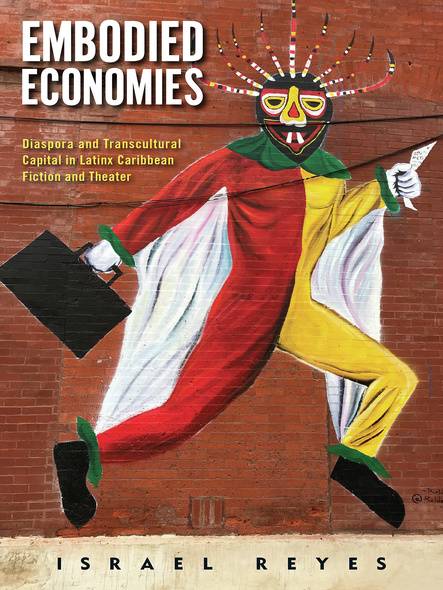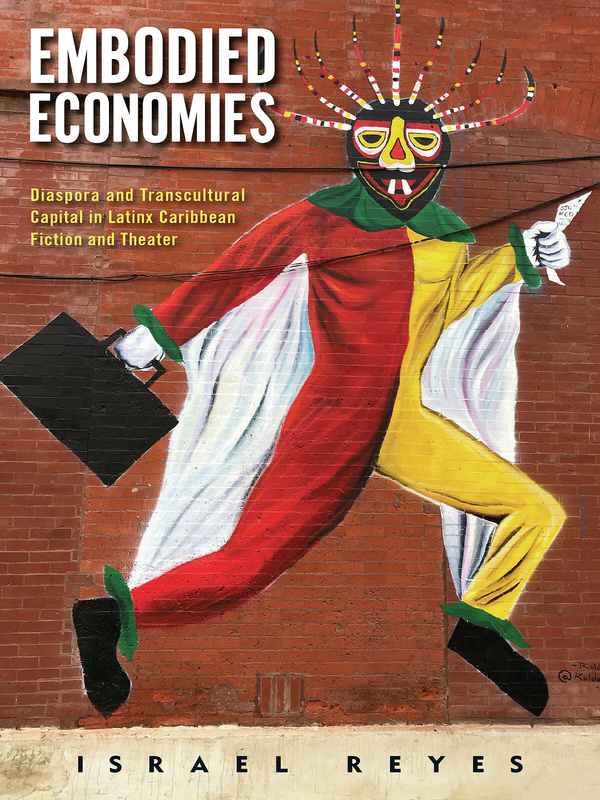
252 pages, 6 1/8 x 9 1/4
Paperback
Release Date:13 May 2022
ISBN:9781978827851
Hardcover
Release Date:13 May 2022
ISBN:9781978827868
Embodied Economies
Diaspora and Transcultural Capital in Latinx Caribbean Fiction and Theater
By Israel Reyes
Rutgers University Press
How do upwardly mobile Latinx Caribbean migrants leverage their cultural heritage to buy into the American Dream? In the neoliberal economy of the United States, the discourse of white nationalism compels upwardly mobile immigrants to trade in their ties to ethnic and linguistic communities to assimilate to the dominant culture. For Latinx Caribbean immigrants, exiles, and refugees this means abandoning Spanish, rejecting forms of communal inter-dependence, and adopting white, middle-class forms of embodiment to mitigate any ethnic and racial identity markers that might hinder their upwardly mobile trajectories. This transactional process of acquiring and trading in various kinds of material and embodied practices across traditions is a phenomenon author Israel Reyes terms “transcultural capital,” and it is this process he explores in the contemporary fiction and theater of the Latinx Caribbean diaspora.
In chapters that compare works by Lin-Manuel Miranda, Nilo Cruz, Edwin Sánchez, Ángel Lozada, Rita Indiana Hernández, Dolores Prida, and Mayra Santos Febres, Reyes examines the contradictions of transcultural capital, its potential to establish networks of support in Latinx enclaves, and the risks it poses for reproducing the inequities of power and privilege that have always been at the heart of the American Dream. Embodied Economies shares new perspectives through its comparison of works written in both English and Spanish, and the literary voices that emerge from the US and the Hispanic Caribbean.
In chapters that compare works by Lin-Manuel Miranda, Nilo Cruz, Edwin Sánchez, Ángel Lozada, Rita Indiana Hernández, Dolores Prida, and Mayra Santos Febres, Reyes examines the contradictions of transcultural capital, its potential to establish networks of support in Latinx enclaves, and the risks it poses for reproducing the inequities of power and privilege that have always been at the heart of the American Dream. Embodied Economies shares new perspectives through its comparison of works written in both English and Spanish, and the literary voices that emerge from the US and the Hispanic Caribbean.
Embodied Economies is a thought-provoking Caribbean diasporic voyage that challenges us to rethink our expectations about Latinx culture under neoliberalism. In his accessible yet profoundly learned prose, Israel Reyes offers inspired queer, feminist, and social-science inflected readings of relevant literary and theatrical works in English and Spanish by prize-winning playwrights, novelists, and performers. This book is an eagerly awaited contribution to transnational, hemispheric studies of the Americas.
Embodied Economies offers a welcome expansion and deepening of current critical conversations about the work of contemporary US Latinx literature and literary studies. Reyes effectively balances the ambition of his theoretical and methodological interventions with a finely tuned, elegant praxis of granularly close textual readings. He engages established scholars and new students in the field with a generative critical inquiry and exchange whose value and necessity will be proven in the very kind of work they will make newly possible.
Embodied Economies is a thought-provoking Caribbean diasporic voyage that challenges us to rethink our expectations about Latinx culture under neoliberalism. In his accessible yet profoundly learned prose, Israel Reyes offers inspired queer, feminist, and social-science inflected readings of relevant literary and theatrical works in English and Spanish by prize-winning playwrights, novelists, and performers. This book is an eagerly awaited contribution to transnational, hemispheric studies of the Americas.
Embodied Economies offers a welcome expansion and deepening of current critical conversations about the work of contemporary US Latinx literature and literary studies. Reyes effectively balances the ambition of his theoretical and methodological interventions with a finely tuned, elegant praxis of granularly close textual readings. He engages established scholars and new students in the field with a generative critical inquiry and exchange whose value and necessity will be proven in the very kind of work they will make newly possible.
ISRAEL REYES is a professor of Spanish and Portuguese at Dartmouth College in Hanover, New Hampshire. He is the author of Humor and the Eccentric Text in Puerto Rican Literature.
Note on Translations and Terminology
Introduction
1. A Future for Cuban Nostalgia in Plays by Nilo Cruz and Eduardo Machado
2. Decolonizing Queer Camp in Novels by Edwin Sánchez and Ángel Lozada
3. Zero-Sum Games in Fiction by Junot Díaz and Rita Indiana Hernández
4. The Gentrification of Our Dreams in Lin-Manuel Miranda’s Musical Theater
5. Race, Sex, and Enterprising Spirits in Works by Dolores Prida and Mayra Santos Febres
Conclusion
Acknowledgments
Bibliography
Index
Introduction
1. A Future for Cuban Nostalgia in Plays by Nilo Cruz and Eduardo Machado
2. Decolonizing Queer Camp in Novels by Edwin Sánchez and Ángel Lozada
3. Zero-Sum Games in Fiction by Junot Díaz and Rita Indiana Hernández
4. The Gentrification of Our Dreams in Lin-Manuel Miranda’s Musical Theater
5. Race, Sex, and Enterprising Spirits in Works by Dolores Prida and Mayra Santos Febres
Conclusion
Acknowledgments
Bibliography
Index





